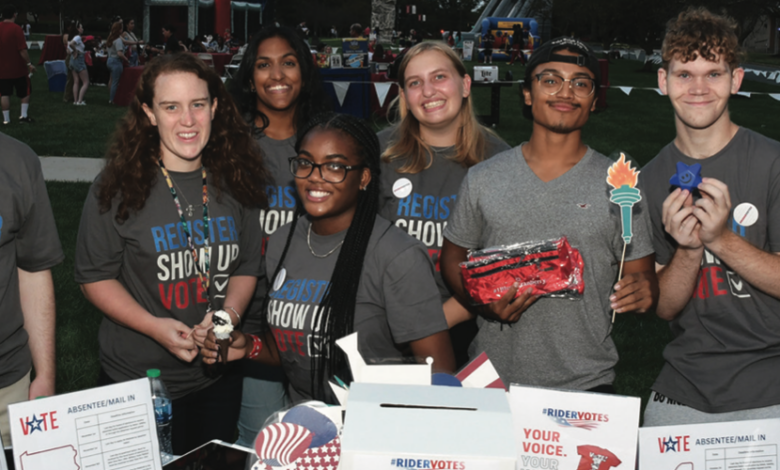
Rider recognized as one of the best colleges for voting
By Kaitlyn McCormick
College students across the country showed up from 1,556 in 2018 to 3,280 in 2020.
to the polls or mailed in their ballots for the Nov. 8 congressional election, and initiatives like Rider Votes are posed to make sure even more young adults register in the future.
Rider Votes was established in 2016 to encourage and increase student voting turnout, and this August, Washington Monthly recognized Rider as one of its 230 best colleges for voting in America. This polling was out of 850 considered institutions, according to a September press release from the university.
“Thinking about voting starts months before,” Director of Service and Civic Engagement Joan Liptrot explained. Last May, she said, faculty, staff and students came together to create a loose action plan for what they wanted to accomplish through Rider Votes.
The plan included measures such as incorporating voter registration into popular events on campus and coordinating community-based voter registration efforts.
While not every goal in the plan was met, Liptrot estimated that through tabling at events like Cranberry Fest and collaborating with the Student Entertainment Council, she and her team of students still spoke to about 1,000 Broncs this semester alone.
It was “discouraging” and “disheartening,” Liptrot said, to encounter the handful of students that had no interest in registering or voting.
“Your vote today impacts your future,” Liptrot said. “We don’t care what party you register for, we just want you to register. We don’t care who you vote for … we just want you to vote.”
According to Rider’s 2022 National Study of Learning, Voting and Engagement (NSLVE) Report from the Institute for Democracy and Higher Education out of Tufts University, the number of students who registered to vote increased from 3,339 in 2018 to 3,778 in 2020, and the number of students who voted followed that trend, increasing from 1,556 in 2018 to 3,280 in 2020.
While it’s important to contextualize these increases by remembering that 2020 was a contentious year for the presidential election, when it comes to civil engagement, presidential elections are not the only ones that matter. Liptrot said, “Most decisions that affect our daily day-to-day life happen at a local level, so that means school boards … county commissioners, town officials, things like that.”
Junior political science major Maria Castillo is one student involved with Rider Votes. She gave her perspective on student voting registration and the importance of staying informed.
“I feel like now a lot of young college students are not involved in politics,” Castillo said.“They have no idea who their senators or state representatives [are]. And they have really good points when they speak about what they want to see in America, but at the same time, they have no idea what’s going on politically.”
Castillo stressed how important it is for students to utilize the resources available to them to make informed decisions, not only provided by the university, but also the services available on the internet to research their legislators.
For students that may not have voted in the midterms, Liptrot asks, “What do you want your community that you live in to look like? … You need to start being a part of building that community now.”


